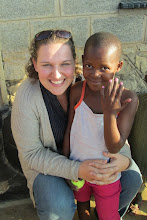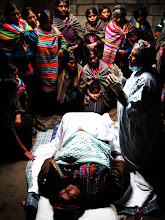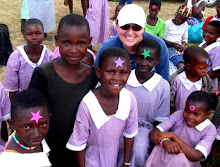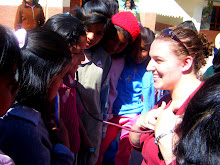In his 2005 commencement speech at Kenyon College, author David Foster Wallace told a story of two fish swimming along in an ocean. One day, the first fish turned to the second fish and inquired, "What is water?" The second fish looked perplexed, and replied, "Hmm... I don't know. What IS water?" Both of them continued to swim along, utterly unaware of the precious fluid around them, making their existence possible.
While a slightly comical depiction of ignorance and the power of perspective, this story makes an adept and insightful point... Sometimes it's the things that surround us every day that we have the most trouble "seeing." We all miss the "big picture" sometimes. We let hurried schedules and day-to-day frustrations obscure our ability to contextualize what's really happening, all around us.
As a high school teacher in the tiny mountain village of Ha Selomo, I try to keep Wallace's parable in the forefront of my mind. However, this is easier said than done. That's because, once the duffle bags are unpacked, the culture shock wears off, and your little thatch-roofed rondaval in the Maluti mountains starts to feel like home, life takes on a new rhythm. At some point during my first year living in Lesotho, I transformed from an adventurous and idealistic Peace Corps Volunteer, who dreamed of changing the lives of children in this little corner of southern Africa, to a regular, run-of-the-mill Math and Science teacher at Linokong High School. On any given day, I'm not heroically saving the world. I'm simply 'Me Limpho (dim-poe), the funny
lekhooa teacher. I'm that obnoxious high school teacher we all remember... The one who gets over-excited about quadratic equations, while 11th graders roll their eyes with a "Here she goes again!" kind of humor. I gossip with my Basotho colleagues, lose my temper when Likhapha and Maelisa won't stop whispering in the back of Physics class, and despite my best efforts, constantly seem to have a massive pile of tattered notebooks teetering on the corner of my desk, waiting for my red marking pen. My life in Ha Selomo is "normal"- Busy, imperfect, mundane, full of little joys and innumerable frustrations, but normal. It's a rare day when I can identify with the idealized image of the noble PCV smiling from the "YOU can make a difference, too!" Peace Corps poster.
In the wake of daily life, it's all too easy for me to loose sight of the "big picture." My students aren't nameless stereotypes of "poor, black African" children, that stare back at you from a CNN news-broadcast... They're individuals. They're my hilarious, Sesotho-gossiping, Beyonce-loving, giggly teenagers. In so many ways, they are no different from millions of kids around the world. So I often forget that, for my students (as with most), there is more than meets the eye. Occasionally, however, something will happen that reminds me that what I
do on a daily basis is not my purpose in being here. For a brief instant, I will catch a glimpse of the hidden pain and suffering that surrounds me. It reminds me why I came to this rural corner of the world. It whispers...
This is water.
Last Monday, I arrived to school at 6:50am, well-rested and ready to get my goofy 8th graders excited about drawing angles. At morning assembly the Headmaster made a simple announcement, "That boy, Teboho, who was studying in Form B, has fallen over and died during the weekend." And then, without a second thought, life goes on. But my world comes to a halt, as grief washes over me. Nobody cries. Nobody comments. Nobody says it aloud. We don't talk about such things here. But it whispers...
He had AIDS.
This is water.
As Thembekile and I are cleaning up after our weekly "Young Women's Group," I ask her what village she lives in. "Ha Sebophe," she replies. "I live with my grandmother, but I don't know for how long," she says, as the smile that normally lights up her face melts into sadness and fear. "I don't have a father. And my mother doesn't want me." In a sudden moment of honesty, she turns to look me in the eyes... Then she asks,
Am I an orphan?
This is water.
The little boy, Makhoro, who lives next door to me in village
ko-kos at my door late one night. Normally, his daily knocks come with excited stories of his day at school or a polite request for help with homework. Tonight he's upset. There is no food at his home. His empty stomach growling says...
I am hungry.
This is water.
My friend, Thato, grabs my hand after church. Her Math teacher tried to force her to have sex with him yesterday. He's stolen her phone. She asks me to go to the school to get it back from him. As she tells me everything, she quietly repeats to herself, over, and over, and over...
I am afraid of men.
This is water.
The lesson of "This is water" is that we are all constantly surrounded by truths that we forget to
see. We don't stop long enough to question what's really happening beneath the surface. This is not simply an experience or lesson of living in a developing country. There is a hidden truth behind every culture, place, event, or person. My gift from Peace Corps has simply been one of perspective. It is teaching me to open my eyes and
see past what people show me. To look beyond what I
do here, to what I am
doing here
. Peace Corps is teaching me to recognize that
THIS is water.
With Love from Lesotho... -Mary E.













